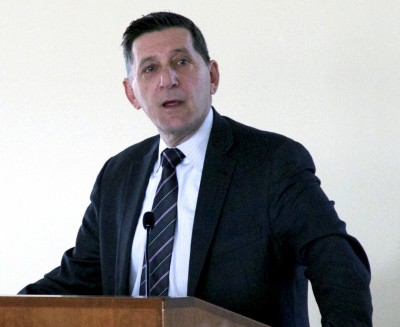
Michael Botticelli, director of the Office of National Drug Control Policy, speaks Wednesday at the Boston University School of Public Health. PHOTO BY MARY SCHLICHTE/DAILY FREE PRESS STAFF
In March 2014, former Massachusetts Gov. Deval Patrick declared opiate abuse a public health emergency. Though progress has been made on the federal level in terms of addressing opiate abuse, the road to curbing the epidemic remains a long and winded one.
On Wednesday, the Boston University School of Public Health hosted the Public Health Forum to address substance use disorders and the role healthcare professionals play in treating substance use disorders. The forum, held at the BU School of Medicine, featured Michael Botticelli, director of the White House Office of National Drug Control Policy.
During the forum, Botticelli addressed the issues that impeded better treatment for substance use disorders, including the lack of early intervention for substance use.
“I grew up in a family, an extended family riddled by addiction. And I think what we do for people who are at risk for other diseases, we pay closer attention to them as they are developing,” Botticelli told attendees at the forum. “I don’t recall a physician, or a school nurse telling me that ‘Michael, you are at risk because of genetic disposition. You can’t drink like everyone else can because you’re going to have a different reaction.’”
Botticelli said the issue is not the lack of knowledge that substance use is a disease of early onset. The scientific community knows that age of first use predicts future problems, and individuals who start drinking at age 15 are more likely to develop substance use disorders, Botticelli said. However, in contrast with other conditions such as hypertension, early onset substance use oftentimes goes untreated.
“We don’t say to people who have hypertension, ‘You have to have a heart attack before you really, really need [treatment],” Botticelli said. “We really want to reframe our thinking.”
Substance use disorders may partially be attributed to overprescribing medication, Botticelli said. Strong prescription painkillers such as Oxycontin have contributed to the surge in the opioid epidemic in Massachusetts.
“This crisis is created by our healthcare system,” Botticelli said. “We saw this right here in Massachusetts where in 2010, drug overdose deaths surpassed vehicle accidents.”
This forum is a part of National Public Health Week, which takes place during the first full week of April, said Brendan Hoey, manager of student services at SPH. Sponsored by the American Public Health Association, NPHW aims to promote the field of public health and highlight national public health issues.
“Here at SPH, we always organize several events throughout the week to kind of take part in the initiative and help to highlight public health,” Hoey said.
Hoey said that Sandro Galea, dean of SPH, organized Wednesday’s forum to bring attention to substance abuse.
“I think substance abuse is a problem that affects our community here in Boston and especially around the Boston Medical Center, where we’re located,” Hoey said. “It affects our state. There has been an increasing number of overdoses within Massachusetts over the past few years, and it’s important to think about also on a national level.”
Among those trying to help addicts recover is Jack Kelly, founder and CEO of iRecover, a newly launched mobile application designed to foster a supportive community for recovering addicts.
Kelly, who previously worked at Massachusetts General Hospital, said being able to communicate problems with likeminded individuals is one of the keys to successful recovery.
“Research and data have demonstrated that the concept of one addict [or] one alcoholic helping another is very prevalent. This is a very tribalistic society that really feeds off one another,” Kelly said. “The ability to relate to somebody who’s struggling with the same exact problem you are has such a powerful effect.”
Kelly said he acknowledges the importance of the government in helping find a solution to substance abuse in Boston. He testified before Massachusetts Gov. Charlie Baker’s opioid abuse task force on April 2.
“One of the elements I talked about is stigma and how we reduce stigma. A big part of it is demonstrating to the world that people who have had addiction problems and are now in recovery, we need to highlight those people,” Kelly said. “Highlight and hire. That’s the message I said to the committee. If we have solutions and want to implement them and pay people to implement them, we should consider people who are in recovery and train them to implement these solutions because that sends the message to the rest of the world that people can recover, and we demonstrate that we also trust them.”
During the forum, Botticelli also addressed the stigma associated with substance use and said that it hinders progress.
“Clearly, there’s a lot of stigma,” Botticelli said. “We have a long way to go to change public perception. Think of our work on tobacco and how we changed public norms around it. One of the strategies we used is increasing the price. If we raise the price of cigarettes by 25 cents, we can see the decline in underage use because kids are price sensitive.”
In terms of heavier substance use, the implications of continuing to use language that is shameful in nature can be dire, Botticelli said.
“We are not drunks and junkies and addicts,” Botticelli said. “Part of what we need to do is reframe the language in this field.”
The road to recovery involves more than researchers and scientists, Botticelli said. It is equally important for health professionals to recognize and harness the power of the people, especially those who are in recovery.
“Science and data are not enough to drive public policy,” he said. “People drive public policy.”





Although I agree with most of this article, it still makes me angry.
Why? Because all of this talk about health and treatment and reducing stigma is all being made in the context of a Drug War that ruins people’s lives. It is Mr. Botticelli’s job to support and defend this Drug War.
It’s like half the time, he talks out one side of his face… half the time, the other.
I suppose I give him the benefit of the doubt, that he’s doing what he can within the confines his role demands, but still… angry that he seems to give with one hand and take away with the other.
End the Drug War. Treat all of this as a human and health issue. Portugal did it around 15 years ago, with much greater success than any policy of criminalization has ever had.